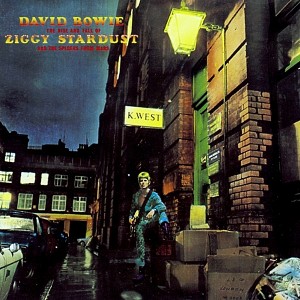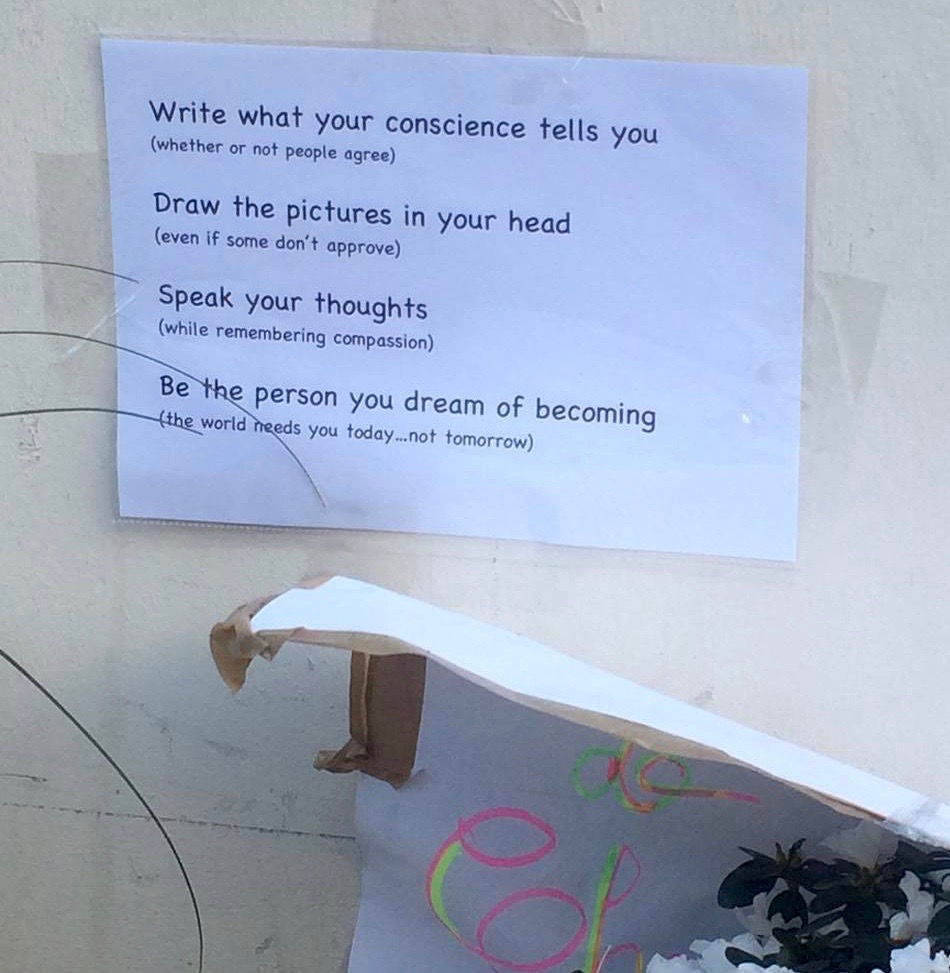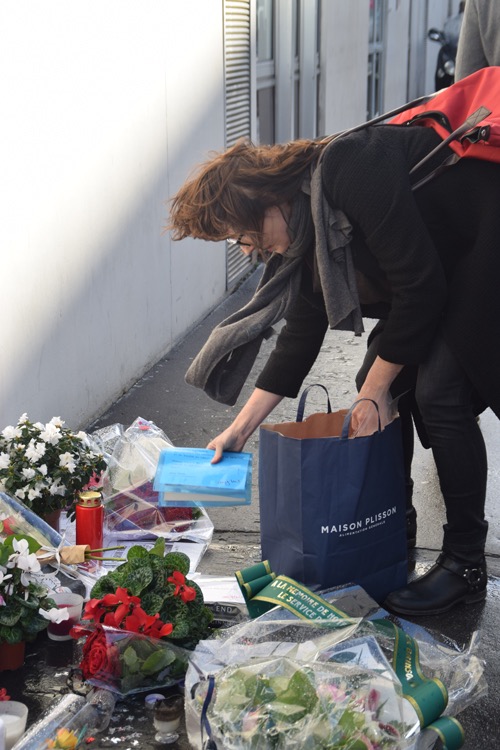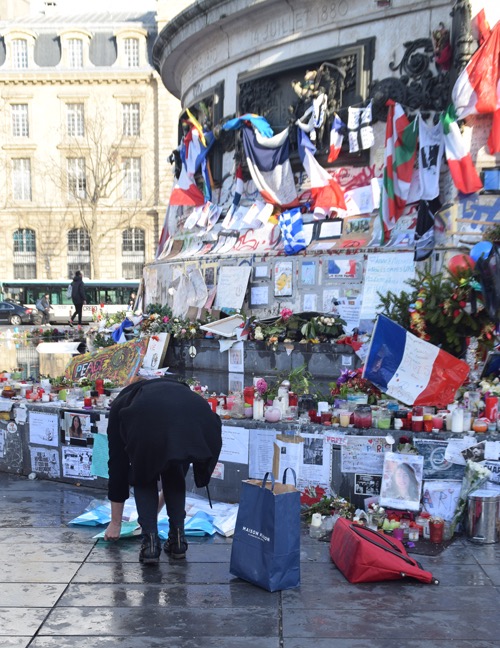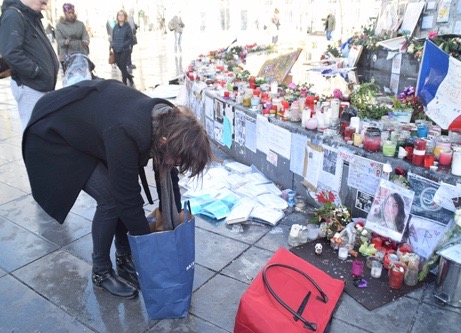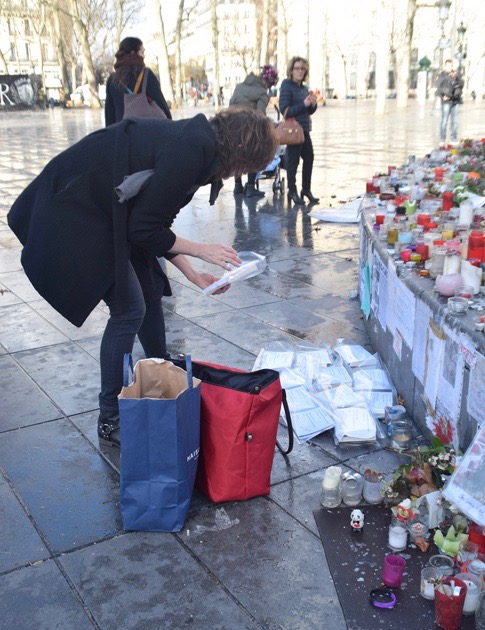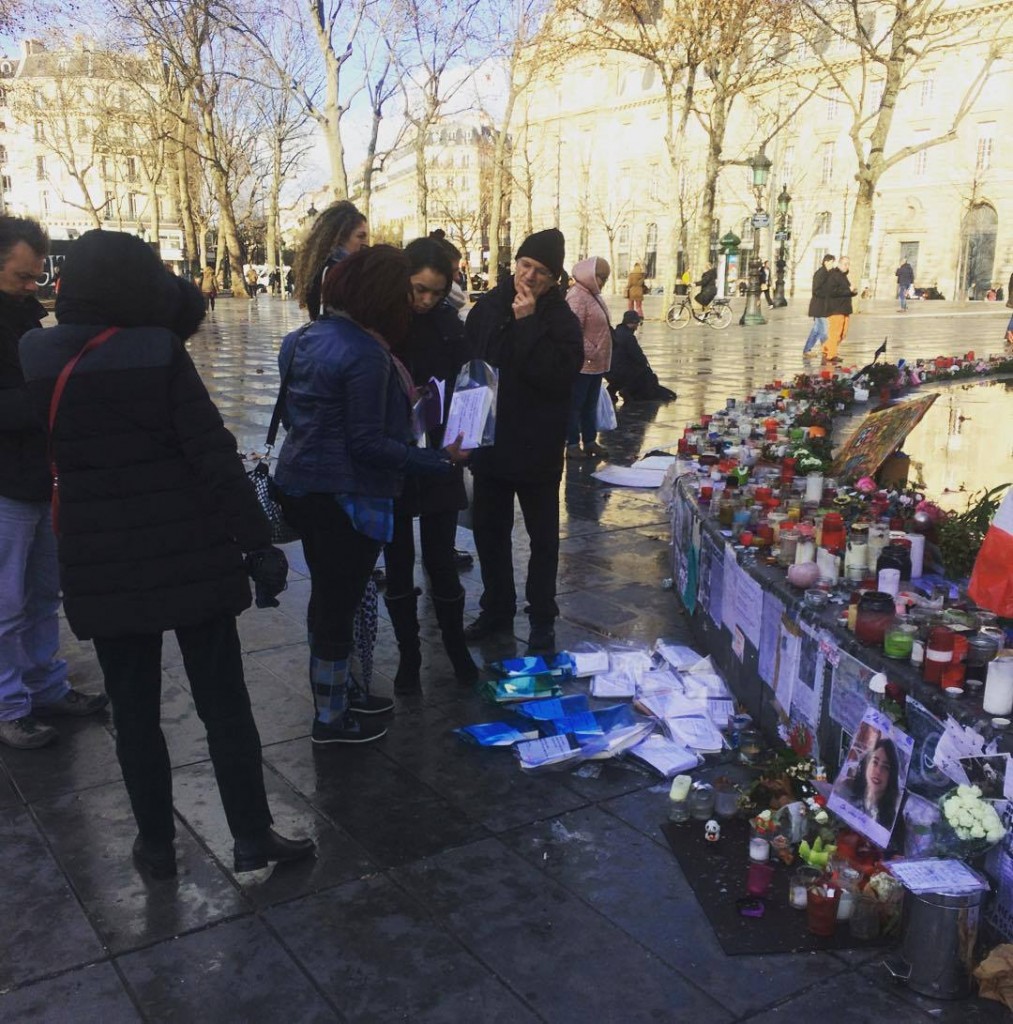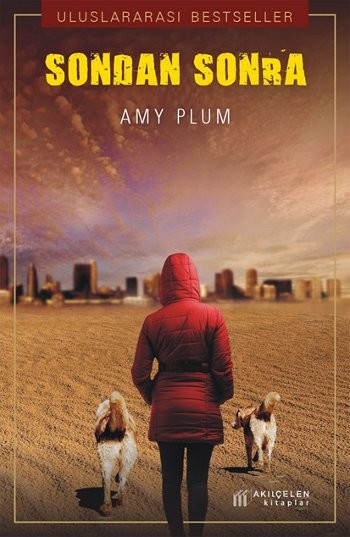I have avoided writing this for days. I keep putting it off. I feel like when I post it, it will be time to move on. And I don’t know if I can do that. I feel frozen. On hold.
Unlike after Charlie Hebdo, when my friends and readers allowed me to leap into action, posting more than three-hundred notecards for them at the memorial site with good wishes from around the world, this time I haven’t felt like doing anything.
Why is it different? Maybe because this time I’ve felt like hiding. Maybe because it feels like it’s not over.
The morning after the attacks, I slept until 8:30, when the kids came and piled into bed with me. I had finally fallen asleep at 3:30 a.m., after resorting to half a Xanax to help block out the ambulance sirens and lights outside my window.
“You can watch cartoons,” I croaked. My kids cheered at the unexpected treat and ran out to turn on the TV. I had a moment of panic, thinking that they might turn on a news channel, but as soon as I heard Spongebob speaking in French, I knew they were safe.
Almost immediately, my phone started buzzing with new messages from worried friends and family, and I gave up on the idea of sleep. I got up and walked into the living room, where my kids stared at the screen, mesmerized by the mindless animation. And I had the overwhelming desire to press “pause” on the scene before me. I wanted to stay in the “before they knew” just a little longer.
I got breakfast and put it on the coffee table. That got their attention. Breakfast in front of the TV? The world must be coming to an end. Little did they know.
“Something bad happened last night,” I said. They looked at me, waiting. “It’s kind of like in January with Charlie Hebdo. Bad guys killed people in Paris, but this time it was worse. More people were killed.”
“Okay,” they said.
“I know we were supposed to go to the Science Museum and swimming today, but people are still upset, so the museums and swimming pools are closed. We’ll just stay at home. Daddy’s worried too,” I added. “He wants to come back to Paris to see you.”
“Is it dangerous outside?” my son asked.
“It could still be dangerous,” I admitted. “The police aren’t sure yet. That’s why we’re going to stay home.”
“Tell Daddy not to come until it’s safe,” he responded.
“If we’re staying home all day, can we have more screen time?” my daughter asked, fishing for more than their half-hour per day of games on weekends. I said yes.
They turned back to the TV.
And that was it.
There had been a massacre in Paris, the second terrorist attack in ten months, and my kids were more concerned about Spongebob and video games. As I went back to my room to start answering messages, I realized that this is my children’s reality. This is the world they are growing up in. One of random killings. Of unknown danger.
At lunch I did what we, as parents, had been told to do in January. Instead of dishing out information, I asked the kids if there was anything they wanted to know.
“How many bad guys?” my daughter asked.
“I think seven or eight,” I replied.
“Did they catch all of them?” she asked.
“Some of them are dead,” I responded, “but they might have friends. That’s why the police are asking us to stay inside.”
“How did they kill them,” my son asked.
“They shot them,” I said. If I mentioned suicide vests, that would necessitate an explanation. No way was I going there.
“How many people died?”
“A lot,” I said. “Do you want to know a number?”
“Twenty?” he ventured. “Thirty?”
“More than a hundred,” I replied. My kids gasped.
“It’s very sad,” I said, and they nodded. And that was it for question time. They didn’t ask, so I didn’t push.
I watched them later that day, when we finally went outside. A friend down the street had texted, “If I don’t get my kids outside, we’re all going to go insane.” We agreed to go to a tiny park two blocks away. When we arrived, the park gates were locked. We headed for the next-closest park at Place des Vosges, only to discover that its gates were locked too. We opted for standing under the square’s arcade, where the kids used the bag of chalks and soccer net I had brought to turn the 17th century walkway into an art gallery and then a soccer field.
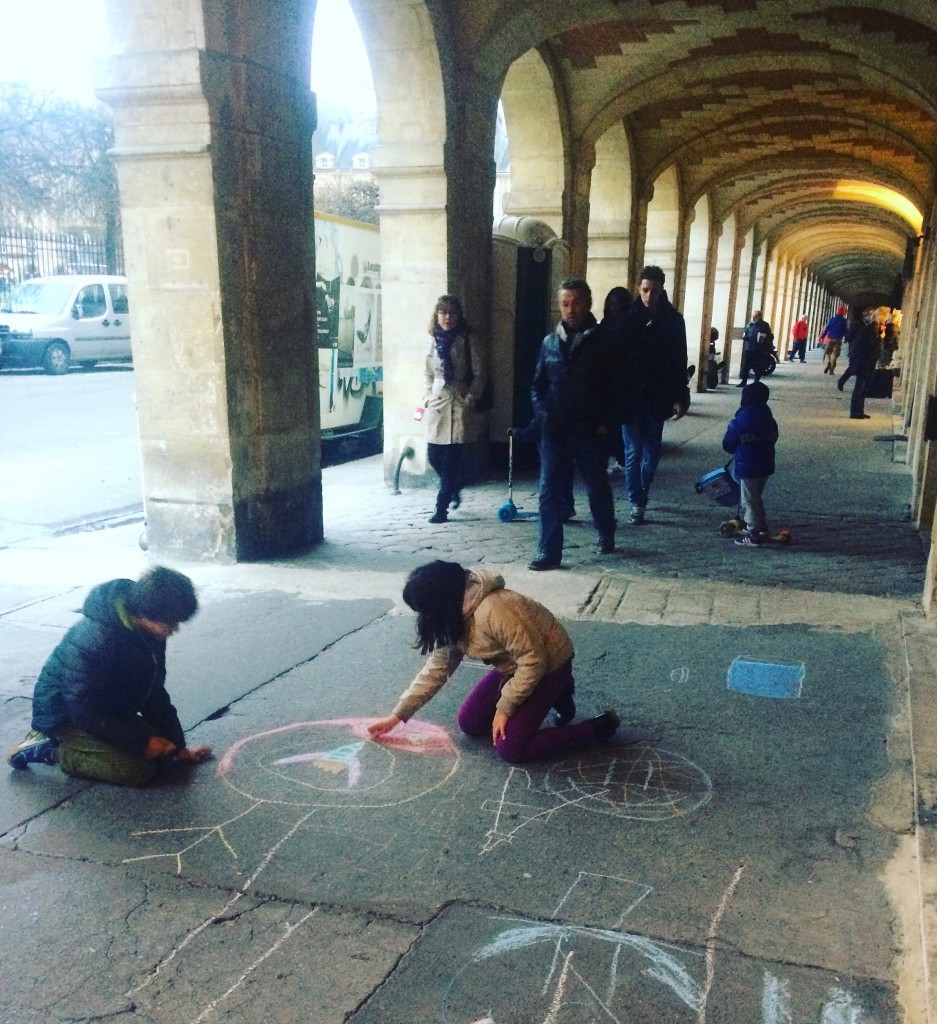
Chalk drawings, Place des Vosges, November 14, the afternoon after the attacks.
Another mom from our school texted my friend and joined us, just as desperate to get her little boy outside for fresh air. I heard the children pass information between themselves. “There was a bomb at the soccer stadium.” “I know.” “A hundred people were killed in our neighborhood.” “I know.” “The bad guys have friends.” “Oh.” They didn’t even look at each other as they traded this information. They just checked in. Made sure they knew what their friends did. Showed that they knew what was going on. It felt more like a ritual than communication. As long as they all knew what the others did, then they were fine.
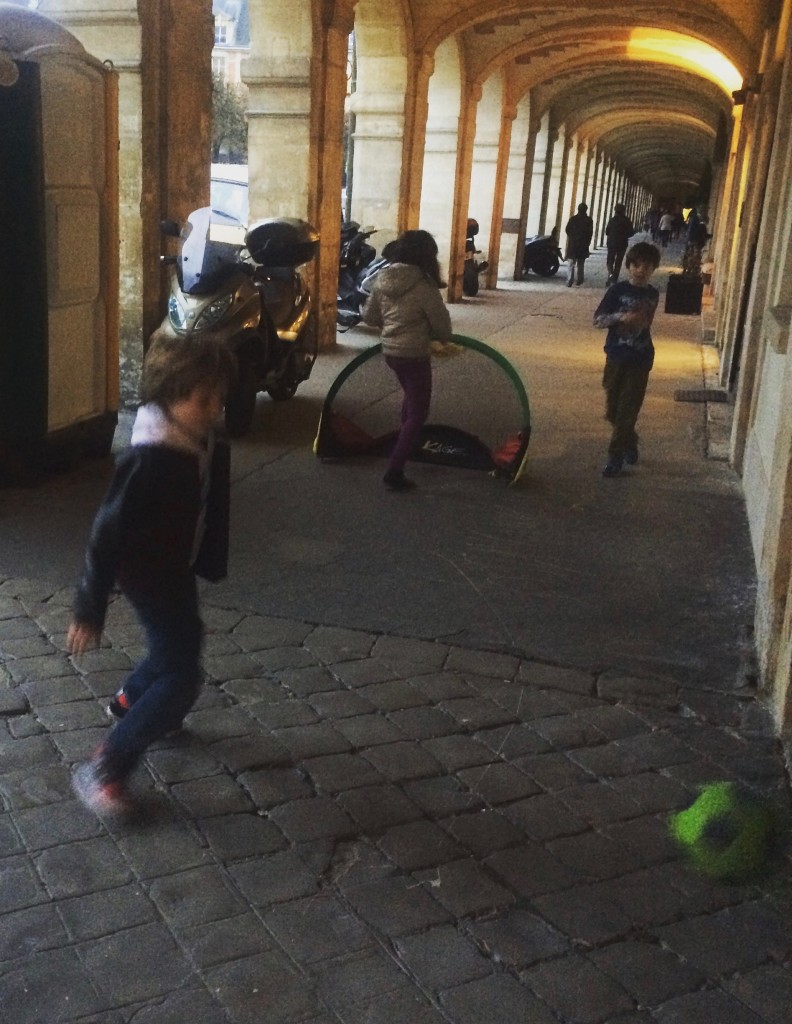
Playing soccer, Place des Vosges, November 14, the afternoon after the attacks.
My children hadn’t actually shown fear until Lucia saw an ambulance on the way to the park. She had grabbed my hand in fright, and I had said, “It’s okay. It’s just one ambulance. It only matters if you see a lot of them.”
On the way back from the park, a convoy of five ambulances, sirens screaming, rushed past us. Lucia looked at me, eyes huge. I checked Twitter. No new attacks. “It’s okay,” I said. “They’re probably just taking people from one hospital to another.” As soon as I said that, she relaxed. And I felt the weight of responsibility bear down on me. My children trust me to keep them safe. That was the scariest realization of the day.
The next day, my ex brought us croissants for breakfast. He was visibly relieved to see his children. “You know, it’s safer in the countryside,” he said.
“I barely survived the countryside,” I replied. “Living isolated amongst foreigner-hating farmers is not an option, but if you say you’ll move to New York, I’ll be packed in five minutes.”
“It would be the same in New York,” he responded.
“So I guess we’re staying,” I concluded.
Friends and family had been writing me non-stop, suggesting, “Maybe it’s time to come home.” But this is home. My parents are dead, and I don’t have family in places I would live. Anywhere else would be picking a random American city. After living eight years in New York, I can imagine living there. But my ex is staunchly against the idea, and I know myself that Paris is more family-friendly. At least…it was.
I talked about it with an American friend whose kids go to school with mine. She lives next to Bataclan, and still had bloody surgical gloves scattered around her courtyard—leftovers from where paramedics had set up an emergency triage center on Friday night. “It seems paranoid to want to move,” she said. I agreed. “But I can’t help wondering,” she continued, “if this is one of those situations that people will look at in hindsight and say, ‘That’s when we should have left.’”
The next morning, I had an email from our school’s parents’ association. Attached was a letter asking for more security at the school. We were asked to sign it and forward to the mayor of Paris, the mayor of our neighborhood, and the police chief. It insinuated that the location of my children’s school—between the old offices of Charlie Hebdo and the Bataclan—dictated the level of future risk, and suggested scenarios that quite frankly scared the shit out of me.
Every time there’s a school shooting in the U.S., I thank my lucky stars I won’t have to ever worry about that with my kids. Monday morning, I walked my kids to school thinking, “This must be what American parents feel like the morning after a school shooting.” I was so frightened that my stomach was in knots. I saw fear on the other parents’ faces and knew they were similarly affected.
We watched our children until they disappeared down the hallway, and then stood outside and talked. One of my son’s friends lives on the same block as Bataclan. Her Japanese mother told me the 9-year-old had been asleep during the attack, but her 12-year-old son was awake. “He heard everything,” she said. “Explosions, shooting…” She was too polite to say more, but trauma was etched into the lines of her exhausted face.
The mother of my son’s best friend texted me to ask how he was reacting. She was worried because her son wasn’t reacting at all. Le Petit Cambodge is on their street. She kept her kids inside until the blood was cleaned up, but said he had seen the bullet holes in the windows. She apologized for bothering me, saying she was just worried. I reassured her that my son hadn’t shown much of a reaction yet, and promised to keep in touch.
The stories began to roll in. A girl from my babysitter’s high school was missing. Her father had taken her to the concert at the Bataclan, and lost her during the stampede. Two days later she was reported as dead.
A mother of two kids at a local school was killed. Her husband was on business in China, and rushed to get back for his children.
A British friend had to choose between going downstairs and helping with the injured at Le Carillon and Le Petit Cambodge and staying put with her frightened 9 and 11-year-old daughters who had heard the gunshots. She stayed put.
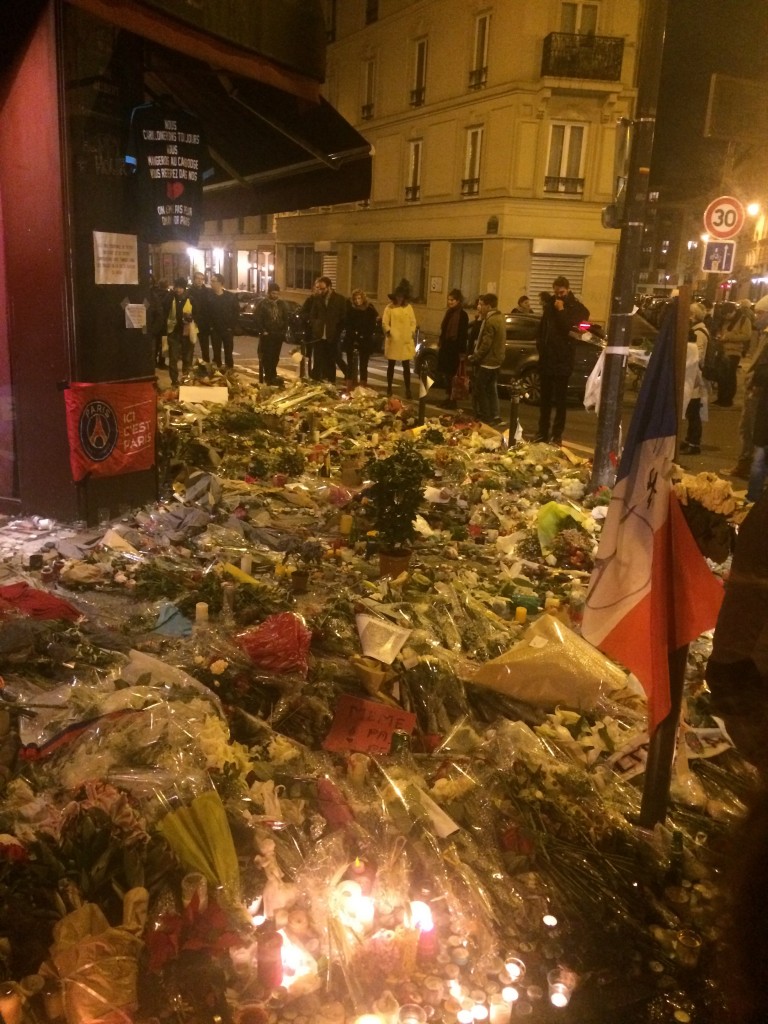
Downstairs from where my friend sat with her daughters…three doors away.
When I picked up my children at the end of the school day, there were five police officers standing outside the school. However shocking it had been to read, our letter had worked. I asked my kids what had happened in school. They told me there had been a minute of silence, after which the principle had summarized what had happened. They didn’t remember what he had said exactly, but my daughter said, “He didn’t mention the bad guys’ friends.” So they were listening on Saturday, I thought. Listening but not responding. At least, not right away.
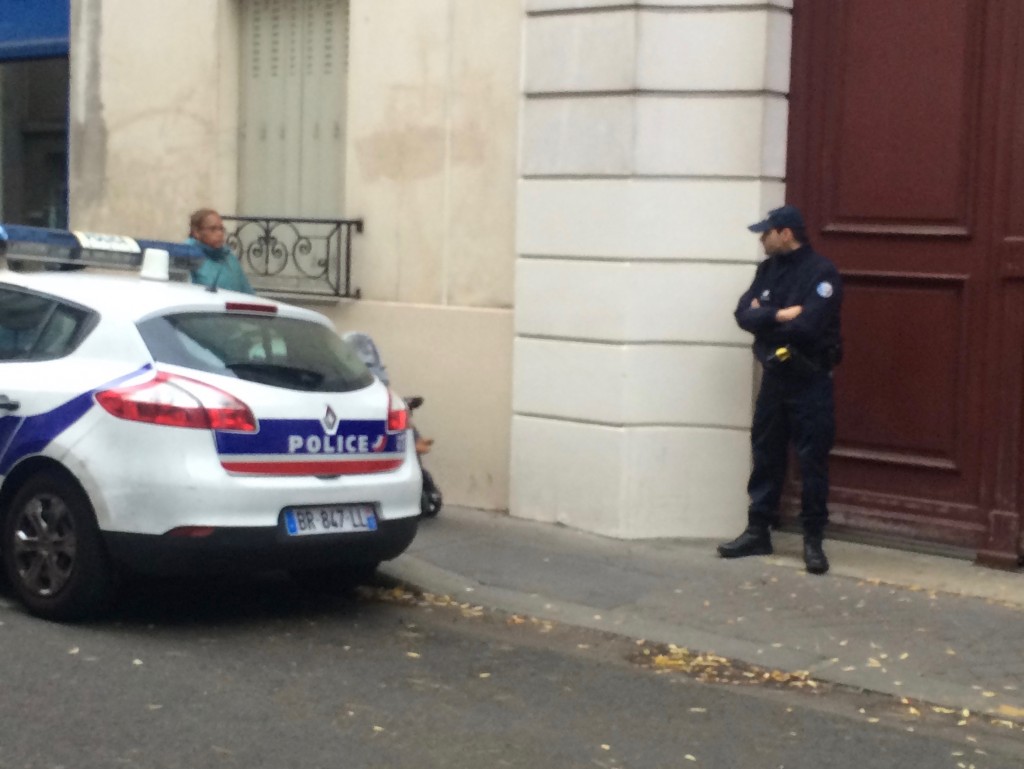
Outside my children’s school, Monday, November 16.
This weekend marked one week since the attacks. Late Sunday afternoon, the kids and I were walking home down a long narrow one-way street. I was very conscious of the fact that on the next street over—identical to the one we were walking down—was the side-door concertgoers used to escape from the Bataclan. It’s where the video was shot with the woman hanging out of the second-floor window. I, of course, hadn’t mentioned this to my children.
The sun was beginning to set. Shadows lengthened in the doorways. The sky was turning dark. My daughter grabbed my hand with her pink fluffy glove, tossed a nervous glance behind us, and said, “I’m scared.”
“What are you afraid of?” I pulled her in to wrap my arm around her shoulders as we walked.
“I’m afraid that there’s a bad guy walking behind us, and he’s going to shoot me right here.” She bent her arm back to touch between her shoulders.
I turned toward her, bending down so that my eyes were level with hers. “No one’s going to shoot you, I promise,” I said…
Wishing that I felt as confident as I sounded.
Wanting to be able to shield her every moment of every day.
Torn between the urge to hide and a fierce inner rebellion against those who want me to. Furious that those two choices are even a part of my consciousness.
Feeling that primal animal instinct that wants to lash out and hurt anyone who endangers my children.
Knowing that hatred is not the answer.
Feeling.
And feeling.
And feeling.
--------------------------------------------------------------------------------------------------------
